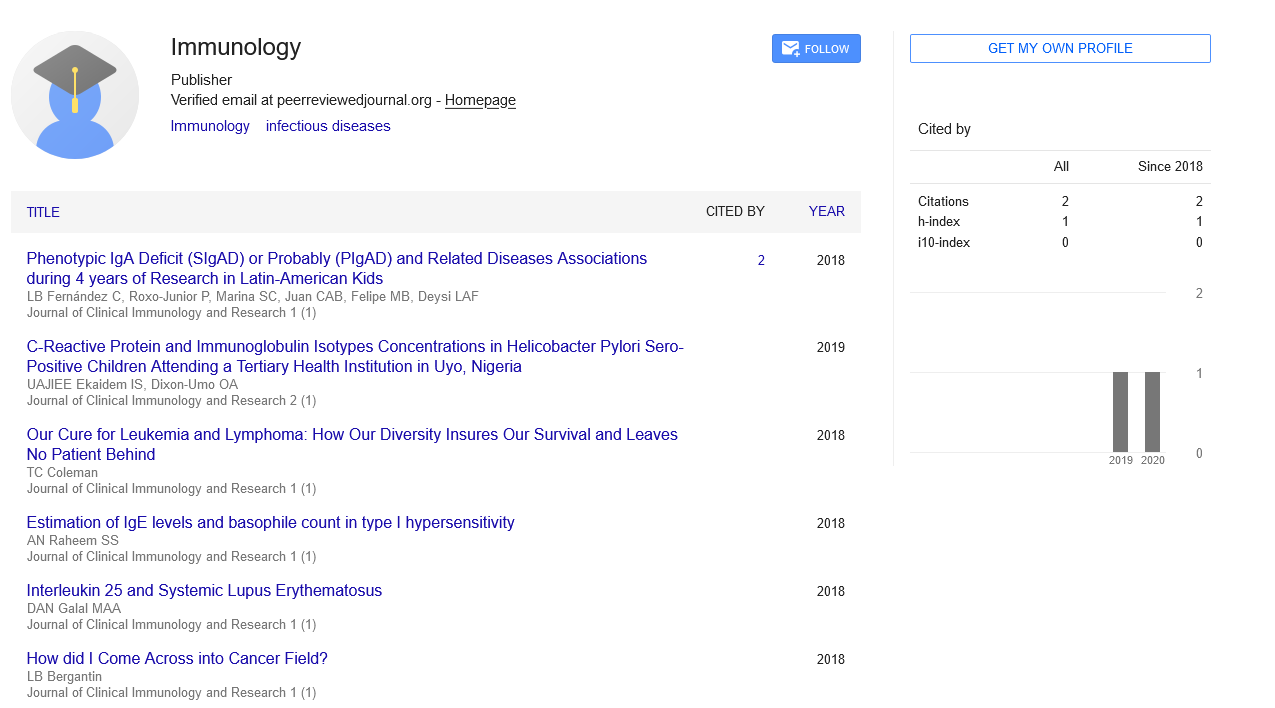Perspective, J Clin Immunol Res Vol: 6 Issue: 3
Innate Immune Memory: Implications for Vaccinology and Immunotherapy
Xiamag Luio*
1Department of Infectious Disease, Ningxia Medical University, Yinchuan, China
*Corresponding Author: Xiamag Luio,
Department of Infectious Disease, Ningxia
Medical University, Yinchuan, China
E-mail: luioxiamag1@gmail.com
Received date: 02 September, 2023, Manuscript No. JCIR-23-116297;
Editor assigned date: 04 September, 2023, PreQC No. JCIR-23-116297(PQ);
Reviewed date: 18 September, 2023, QC No. JCIR-23-116297;
Revised date: 25 September, 2023, Manuscript No. JCIR-23-116297(R);
Published date: 05 October, 2023, DOI: 10.4172/JCIR.100089.
Citation: Luio X (2023) Innate Immune Memory: Implications for Vaccinology and Immunotherapy. J Clin Immunol Res 6:3.
Abstract
Description
Recent discoveries have challenged the conventional view of the innate immune system as lacking memory. The emerging concept of innate immune memory, highlighting its potential implications for the development of vaccines and immunotherapies. The mechanisms behind innate immune memory, its role in protective responses, and its applications in enhancing human health.
Traditionally, the immune system's memory was attributed to the adaptive immune response, primarily mediated by B and T lymphocytes. However, recent research has revealed that innate immune cells, including monocytes, macrophages, and natural killer cells, can also exhibit a form of memory. The concept of innate immune memory, its mechanisms, and the potential it holds for advancing vaccinology and immunotherapy.
The emergence of innate immune memory
Innate immune memory, often referred to as "trained immunity," challenges the long-held belief that the innate immune system lacks the capacity for memory responses. This phenomenon was first observed in the context of vaccines, particularly the Bacillus Calmette- Guérin (BCG) vaccine.
Mechanisms of innate immune memory
Epigenetic reprogramming: One key mechanism of innate immune memory is epigenetic reprogramming. After an initial encounter with a pathogen or immunomodulatory agent, innate immune cells undergo epigenetic modifications, leading to altered gene expression patterns.
Cytokine signaling: Cytokines, such as Interleukin-1 (IL-1) and Interleukin-6 (IL-6), play an important role in initiating and maintaining innate immune memory. These signaling molecules activate intracellular pathways that contribute to trained immunity.
Protective responses and cross-protection: Innate immune memory confers enhanced protective responses upon secondary encounters with pathogens or related antigens. This phenomenon can lead to cross-protection against different pathogens and even unrelated diseases.
BCG vaccine: The BCG vaccine, originally designed to protect against tuberculosis, has been shown to provide nonspecific protection against other infections, including viral respiratory diseases.
Beta glucan as an immunomodulation: Glucan, a component of fungal cell walls, has been explored as an immunomodulatory agent that induces innate immune memory. Preclinical studies suggest its potential for enhancing immune responses against a range of pathogens.
Implications for vaccinology
The concept of innate immune memory has significant implications for vaccine development:
Vaccine efficacy: Understanding and harnessing innate immune memory may lead to the development of more effective vaccines that provide long-lasting protection.
Adjuvant development: Innate immune memory can guide the development of adjuvants that enhance vaccine responses and broaden cross-protection.
Vaccine platforms: Innovative vaccine platforms may leverage the principles of innate immune memory to design vaccines against a wider spectrum of infectious diseases.
Applications in immunotherapy
Innate immune memory also holds potential in the field of immunotherapy:
Cancer immunotherapy: Modulating innate immune memory could enhance the efficacy of cancer immunotherapies, such as immune checkpoint inhibitors and adoptive cell therapies.
Autoimmune diseases: Targeting innate immune memory may offer new approaches for modulating immune responses in autoimmune diseases.
Specificity and duration: Ensuring that innate immune memory responses are specific, durable, and do not lead to excessive inflammation is crucial.
Clinical translation: Moving from preclinical findings to effective clinical interventions remains a complex task.
Safety: Careful consideration of safety concerns, including potential side effects, is essential.
Conclusion
The discovery of innate immune memory has expanded our understanding of the immune system's capabilities. This emerging field has the potential to revolutionize vaccinology and immunotherapy by enhancing protective responses against infectious diseases and offering new avenues for treating cancer and autoimmune disorders. As researchers continue to unravel the intricacies of innate immune memory, collaborative efforts among immunologists, vaccinologists, and clinicians will be pivotal in translating these findings into innovative strategies that improve human health.
 Spanish
Spanish  Chinese
Chinese  Russian
Russian  German
German  French
French  Japanese
Japanese  Portuguese
Portuguese  Hindi
Hindi 